Materials fron Renewable Resources
Plastics manufacture relies heavily on chemicals supplied by the petrochemical industry. This heavy usage of fossil based resources is considered to be unsustainable. In addition plastic currently accounts for 16% of domestic waste in England (DEFRA, 2004) and the majority of this is disposed of in landfill sites. Finding a sustainable solution to the ‘plastics problem’ is a high priority for policy makers. Plant derived oils have potential as a sustainable alternative to mineral oils for production of plastics. Superficially this is an attractive option as plant based plastics could be disposed of in ‘carbon neutral’ ways (e.g. incineration or composting). However, there are several scientific and technical issues to be addressed in order to determine whether plant derived oil is a feasible alternative for industrial scale production of plastics based in the UK. Four crops; soybean, oil palm, rapeseed and sunflower account for more than 65% of vegetable oil production world-wide and the majority of plant oil currently produced is comprised of four fatty acids: linoleate, palmitate, laurate and oleate. However, this is not reflective of the diversity available within the plant kingdom as plants represent a large reservoir of fatty acid diversity with at least 200 different types of fatty acids already described and it is thought many more remain to be discovered. We have studied the suitability of plant oils for the manufacture of plastics. In most cases we chemically manipulate the oil in order to obtain a resin with the desired chemical and technical properties for production of polymer materials (Fig. 1). We have previously utilised commercially available high and low erucic rape (Brassica napus) oil, hemp oil and euphorbia oil as the basis for resins for polyurethane manufacture. The physical properties of the polyurethanes produced from these four oils differed considerably indicating how even subtle changes in oil profile can have significant measurable effects on tensile and impact mechanical properties (Fig 2.)
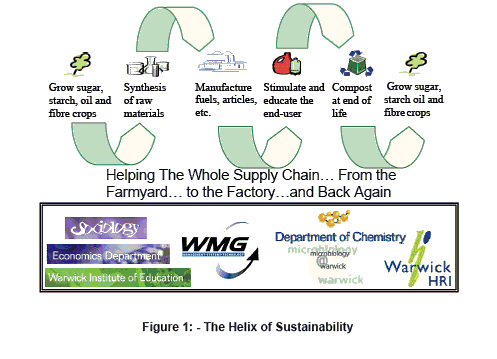

We are members of a number of multidiscerplinary consortia in this area.
Renewable Composites Consortium. Led by Dr. Kerry Kirwan of the Warwick Manufacturing Group and with partners Prof. D. Pink, and Dr. G. Barker of WHRI (Plant Breeding, Biodiversity, Genetics and Genomics).
Adaptive processing of natural feedstocks consortium. Led by Dr. A. Lapkin (Bath, Engineering) with Prof. I. Thompson (Oxford, Microbiology), Dr. G. Barker (WHRI, genetics), Dr. A. (Newcastle), Dr. Y. Ding (Leeds).
We are members of the sustainable composites network, SUSCOMPNET, (see Suscompnet 3)
We have been funded by:
Home Grown Cereals Authority, (see Final Report)
DEFRA, (see Final Report 1), Presentation at DEFRA conference, 2003
Presentation at Eden Project, 2004
See our consortiums report in plastics and rubber weekly Sep 2006.
We are currently exploring the use of vegetable oils (e.g. rapseseed, linseed) and other plant renewable origin oils (e.g. Euphorbia) in the preparation of polyurethanes.



Rapeseed Euphorbia Hemp
We have also prepared vegetable oil composites using hemp and jute.
In collaboration with Sustainable Composites Ltd. , the Eden Project, Warwick HRI and WMG a number of demonstration pieces have been fabricated. We are currently working on a racing car with WMG.
The famous surfboard (and Warwick HRI's Gold Medal Winning Stand at Chelsea)
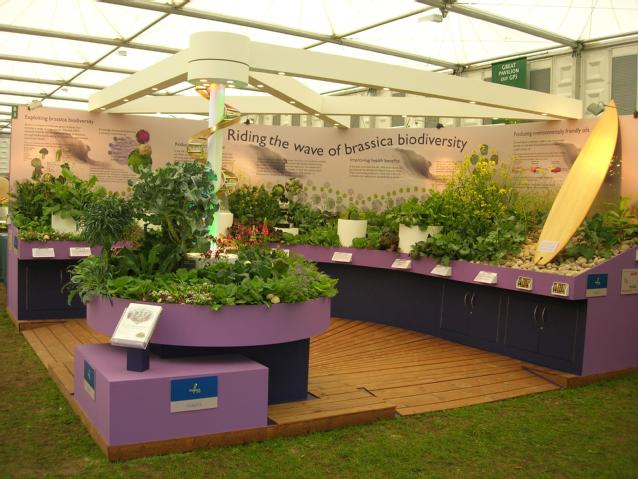
We first epoxidise the oils (see MALDI below)
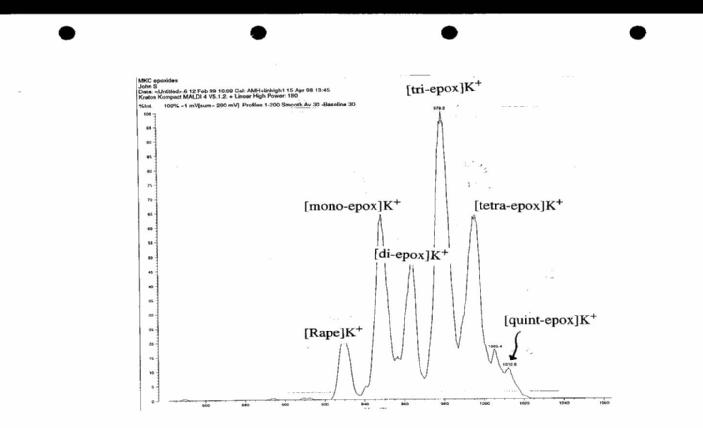
Then ring open them with water to make diols which can be polymerised with diisocyanates. The plastics can be biodegraded by composting
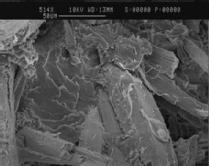
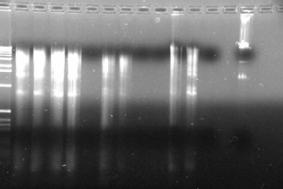
Hemp/rapeseed composite DNA profiles of micro-organisms colonising
SEM pictures plastics after composting
Very recently we have been studying the diversity in oil profiles available within different crop types and using this knowledge determining how the fatty acid composition may affect the properties of the compounds produced from the oil. This has proved very successful and has allow us to develop a novel technique for mimicking the natural oils and hence allow testing of profiles for novel crops prior to expensive breeding programmes. We have gone on to utilise this knowledge to produce a range of polyurethanes with differing properties. We are going on to identify the oil components which convey the different properties in order to be able to predict the optimal composition of the fatty acids required for a given application.
Some publications
- Characterisation using MALDI and Chemical Manipulation of Euphorbia Oil Towards Polymer Feedstocks, A J Clark, in “The Development of Euphorbia Lagascae within the European Community (FAIR CT98/4460)”, Eds D. Turley, M. Fremont and S. Cook, ADAS, 2000, 52-57.
- New Feedstocks for Polyurethane Synthesis. J. A. Sherringham, A. J. Clark, B. R. T. Keene Lipid Technology. 2000, 129-130.
- Mechanical Properties of Hemp Fibre Reinforced Euphorbia Composites. A. J. Clark, N. J. Tucker, L. Mwaikambo. MacoMol. Mat. Engin. 2007, 292, 993-1000.
- Synthetic Mimicking of Plant Oils and Comparison with Naturally Grown Products in Polyurethane Synthesis, S. R. Coles, G. Barker, A. J. Clark, K. Kirwan, D. Jacobs, K. Makenji, D. Pink, Macromol. Biosci. 2008, 8, 526.
- Degradation studies of polyurethanes based on vegetable oils. Part 1.photodegradation, A. Z. Mohd Rus, T. J. Kemp, A. J. Clark, , Progress in Reaction Kinetics and Mechanism, 2008, 33, 363.
- Degradation studies of polyurethanes based on vegetable oils. Part 2. Thermal degradation and materials properties, A. Z. Mohd Rus, T. J. Kemp, A. J. Clark, Progress in Reaction Kinetics and Mechanism, 2009, 34, 1-41.
Recent presentations and patents filed
1. Patent application filed, July 06. Prototyping process for oil-based products - Guy Barker, Andrew Clark, Stuart Coles, Kerry Kirwan, David Pink, Nick Tucker.
2. Keynote talk at FESPB2006 congress (17th - 21st July 06). Sustainable materials from plants : a multidisciplinary research challenge - Simon Bright, Guy Barker, Kerry Kirwan. http://www.fespb2006.org/sessions/biotechnology/biotechnology
3. Poster presented at 5th European Motor BioFuels forum (11th - 13th Sept 06, Newcastle). Production of tailored oils for resin manufacture utilising the biodiversity within plant species - Guy Barker, Andrew Clark, Stuart Coles, Kerry Kirwan, David Pink (no abstract).
4. Talk at Sustainable Use of Materials conference (17th - 19th Sept 06, Oxford). A Novel Approach for Optimisation of Plant Oils for Specific Industrial Feedstocks - Stuart Coles, Guy Barker, Andrew Clark, Kerry Kirwan, David Pink, Nick Tucker. http://www.faraday-advance.net/
5. Talk at 15th Crucifer Genetics Workshop: Brassica 2006 (30th Sept - 4th Oct -06, Wageningen). A novel strategy for optimization of plant oils for specific industrial feedstocks - Guy Barker, Andrew Clark, Stuart Coles, Kerry Kirwan, David Pink, Nick Tucker. http://www.crucifergenetics2006.org/
6. Talk at 3rd VOPNet meeting (18th Oct 06, Eden Project). Novel Approach for Vegetable Oil Polymer Development - Stuart Coles, Guy Barker, Andrew Clark, Kerry Kirwan, David Pink, Nick Tucker. http://www.vopnet.net/
